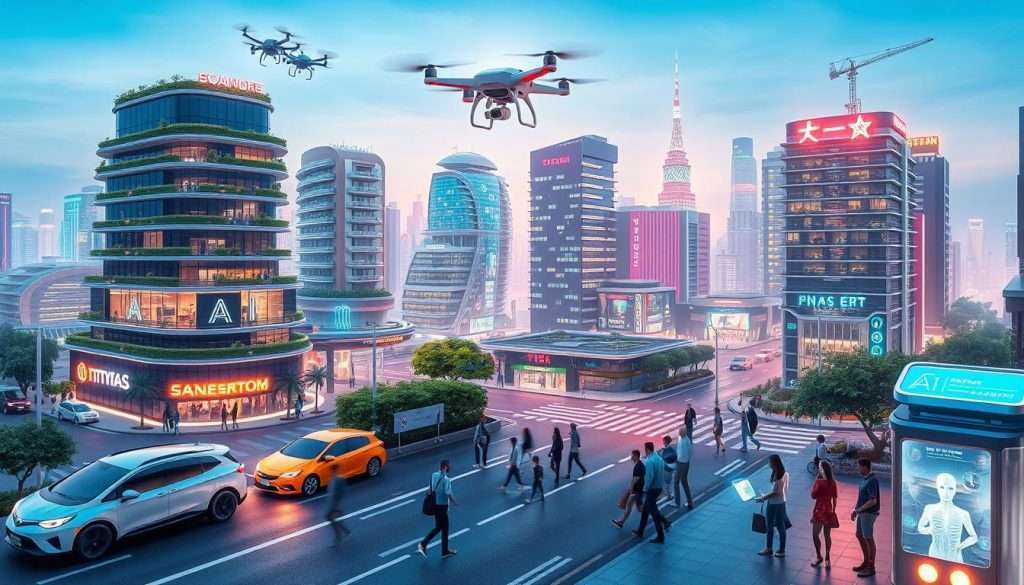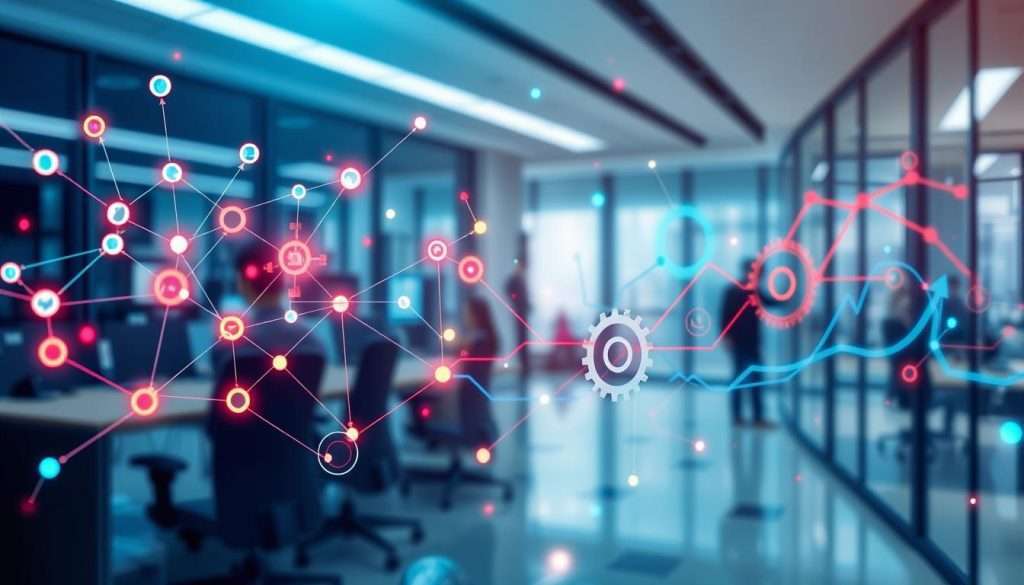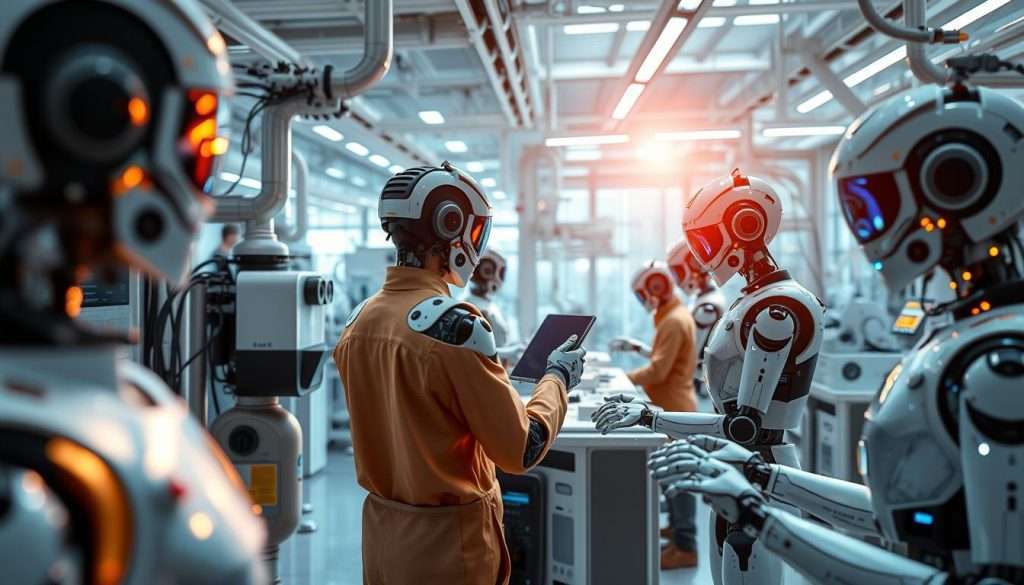Is your business ready for the power of artificial intelligence? AI is set to add $15.7 trillion to the global economy by 2030. This guide will show you the amazing benefits of AI, like how it helps in different industries and makes decisions better.
AI can reduce mistakes and work 24/7. It’s changing healthcare, finance, and customer service. You’ll see how AI makes work smarter and more efficient. We’ll explore AI’s key features and how they can boost your business.

Key Takeaways
- AI is projected to add $15.7 trillion to the global economy by 2030.
- AI applications are rapidly advancing in sectors such as healthcare, finance, and agriculture.
- Technologies like machine learning and natural language processing enhance decision-making and customer experiences.
- Automation through AI minimizes human error, streamlining processes in various industries.
- AI virtual assistants improve productivity both personally and professionally.
- Ethical regulations are being developed to ensure the responsible use of AI technologies.
- AI has the potential to significantly alter job landscapes, creating demand for new skill sets.
What Is Artificial Intelligence?
Artificial Intelligence (AI) refers to machines, particularly computers, that mimic human behaviors and actions. AI systems can learn, think, and improve their actions based on feedback. This is all thanks to AI technology that lets machines do things we thought only humans could do.
AI falls into a few main types:
- Weak AI: Does one specific thing, like chatbots.
- Strong AI: Can do anything a human can.
- Super AI: Is smarter than any human.
AI is getting better fast, thanks to new tech and lots of data. For example, Google Search is a simple AI that helps us find things online. It’s not as smart as some other AI, but it’s useful.
Let’s look at how AI learns:
| Learning Type | Description |
|---|---|
| Supervised Learning | Uses labeled data to train algorithms. |
| Unsupervised Learning | Finds patterns in data without labels. |
| Semi-supervised Learning | Uses both labeled and unlabeled data. |
| Reinforcement Learning | Learn by doing, through trial and error. |
AI is changing many fields, like cybersecurity. It makes things more efficient and secure. As AI keeps getting better, it will change how we do things in many areas.
Understanding AI Technologies and Their Capabilities
Artificial intelligence covers many technologies and types of AI systems. They analyze data, spot patterns, and learn from experiences. These AI technologies use smart algorithms to get better over time. This makes AI very important in many fields.
Some key types of AI use machine learning. This includes methods like linear regression and decision trees. Deep learning is also important. It uses neural networks to make complex decisions.

Natural language processing (NLP) and computer vision are big advancements in AI capabilities. NLP lets machines understand human language. Computer vision helps AI systems analyze images, which is key for things like self-driving cars.
“AI systems can learn, think, and improve their actions based on feedback.”
It uses new methods like transformers to create original content. This technology is changing how we work in many areas.
In short, knowing about the different types of AI and their capabilities is key. AI is changing the world in many ways, making things easier and better for people.
The future of AI technologies looks very promising.
| Type of AI System | Core Technology | Key Capability |
|---|---|---|
| Machine Learning | Neural Networks | Pattern Recognition |
| Natural Language Processing | Text Analysis | Language Understanding |
| Computer Vision | Image Recognition | Visual Data Interpretation |
| Generative AI | Transformers | Content Creation |
Importance of Artificial Intelligence in Today’s World
AI is crucial today. Companies use AI to work better and make smarter choices. By 2030, AI could add over $15 trillion to the world’s economy, showing its big role in business.
Most companies, 72%, have started using AI. It helps them work faster and smarter. AI also helps solve big problems like climate change and health issues, making it even more important.
AI experts in the US make about $102,521 on average. Jobs like AI Engineer and Software Developer pay well, showing AI’s value in the job market.
AI makes things work better and faster than humans in many areas. It’s changing healthcare, banking, and manufacturing. By 2025, AI will create 97 million jobs but also cut 85 million, leading to a net gain of 12 million jobs.
| Role | Median Salary |
|---|---|
| AI Engineer/Scientist | $99,998 |
| Software Developer | $110,140 |
| Computer and Information Research Scientist | $126,830 |
More companies are using Generative AI, showing AI’s key role in daily work. Programs like those at CSU Global help professionals keep up with AI’s demands.
Benefits of Artificial Intelligence
Artificial intelligence brings big changes to many areas, making things better and more efficient. It helps in three main ways, showing how AI can really make a difference in how we work.
Reduction in Human Error
AI is great at cutting down on mistakes. It does things right, without the errors people might make. For example, in finance and data handling, AI makes things more accurate.
In surgeries, AI helps robots do complex tasks better than humans. This shows AI’s power in precision.
Enhanced Decision-Making
AI makes decisions faster and smarter by looking at lots of data. This is super helpful in healthcare, where AI helps spot diseases early. It also helps businesses guess what customers want, so they can plan better.
24×7 Availability
AI works all the time, without getting tired. This is perfect for customer service, like chatbots that help anytime. It makes customers happy and helps businesses stay ahead.

AI Applications Across Various Industries
Artificial intelligence is changing many fields, making things better and more efficient. For example, AI in healthcare helps doctors by analyzing medical images. This speeds up diagnosis and makes it more accurate, especially for serious diseases like pneumonia and tuberculosis.
AI also uses genomic data to create treatment plans that fit each patient. This method focuses on enhancing treatment efficiency while minimizing potential side effects.
The business benefits of AI go beyond health care. In finance, AI helps spot fraud by looking at big data for unusual patterns. Companies use AI to improve customer service, manage risks, and make better financial choices.
Retailers use AI to set prices that match the market and what customers want. This helps them make more money and keep customers happy with personalized offers. AI also helps with managing stock and predicting what people will buy, saving money and making supply chains better.
In aerospace and cars, AI makes vehicles drive themselves, making things run smoother. AI is very flexible, making many processes in manufacturing better and more productive.
Machine Learning Advantages in Business Processes
Machine learning brings big benefits to business processes, driving innovation and efficiency. More companies are using these technologies, with a 10% increase in adoption from 2020 to 2023. This shows how much businesses value the business efficiency machine learning offers.
ML applications help organizations quickly process large amounts of data. This makes decision-making faster and more effective. For example, predictive analytics can analyze millions of data points in just minutes. This is a big improvement over slow manual methods.
Industries like finance and healthcare are already seeing the AI benefits. In finance, machine learning helps spot fraud in real-time. In healthcare, it automates tasks like medical image analysis, letting doctors focus on care. The insurance sector is also embracing ML, with 99% of insurers planning to use AI by 2025.
The job market for AI and ML experts is set to grow by 71% in the next five years. This shows the growing need for ML applications in many fields. With AI set to automate up to 70% of business activities by 2030, businesses must adapt to stay ahead.
As companies use machine learning to boost efficiency and streamline processes, they improve productivity. They also create a more innovative and adaptable work environment.

Cognitive Computing Benefits for Improved Insights
Cognitive computing is a big leap in technology. It helps organizations get valuable insights from lots of data. This method makes data analysis faster and more accurate.
Businesses use cognitive computing to make better decisions. They get insights from AI to guide their choices. This is a big advantage.
Cognitive computing is great at handling unstructured data. This includes emails, social media, and customer feedback. These insights are key to making smart business decisions.
By analyzing huge amounts of data, cognitive systems predict outcomes. They help businesses make quick, informed decisions. This is crucial in today’s fast-changing markets.
AI systems get better with time. They make more accurate predictions and diagnoses. This helps organizations make better decisions.
Here’s a quick look at the benefits of cognitive computing for businesses:
| Benefit | Description |
|---|---|
| Data Analysis Efficiency | Extracts useful information from large data arrays, reducing analysis time and improving accuracy. |
| Unstructured Data Insights | Analyzes varied data types, impacting decision-making through actionable insights from complex sources. |
| Predictive Capabilities | Forecasts future trends and behaviors, enabling risk mitigation and strategic planning. |
| Personalized Customer Experiences | Delivers tailored recommendations based on individual customer behavior and preferences. |
| Automation of Routine Tasks | Frees human resources to focus on strategic initiatives, enhancing overall productivity. |
Cognitive computing helps many sectors, like healthcare, finance, retail, and manufacturing. It makes decision-making faster and more accurate. This way, businesses can predict trends and offer personalized services. This improves customer satisfaction and efficiency.
Intelligent Systems Impact on Operational Efficiency
Intelligent systems are key to making operations more efficient in many fields. They automate tasks like scheduling and reporting. This frees up resources, leading to big savings.
In finance, healthcare, and manufacturing, these systems show their worth. They optimize supply chains and manage risks better. For example, AI in supply chains cuts waste and meets market demands faster. It helps businesses keep the right amount of stock, which is crucial for timely production.
Intelligent systems are also great at preventive maintenance. In factories, they spot equipment problems before they happen.This reduces downtime and repair expenses, allowing companies to concentrate on their core activities.
But, there are limits to what these systems can do. Human behavior can sometimes throw off their plans. Companies need to work on these issues while using AI to improve their processes.

Automation does more than just speed up tasks. For example, AI in identity management checks who’s who, spots scams, and controls access. This makes security better and workflows smoother, boosting productivity.
The success of these systems depends on good training data. Data that’s accurate and up-to-date is crucial for AI to make smart choices. Companies that invest in good data and training can really benefit from AI.
As industries use more AI, they open up new possibilities for innovation. AI helps speed up research and development, getting new products to market faster. It also makes operations more consistent and accurate, letting businesses grow without needing more people.
The changing world makes it important for businesses to use AI. Companies that do will not only work better but also stay ahead in a fast-changing market.
| Sector | AI Application | Operational Efficiency Benefit |
|---|---|---|
| Finance | Risk Management | Improved decision-making and reduced losses |
| Healthcare | Patient Care Management | Enhanced service delivery and outcomes |
| Manufacturing | Predictive Maintenance | Reduced downtime and maintenance costs |
| Retail | Inventory Optimization | Decreased waste and better stock management |
| Telecommunications | Customer Service Automation | Improved efficiency and customer satisfaction |
AI and Smart Automation Advantages
AI technology is changing how we do everyday tasks, making things more efficient. It helps both companies and people do routine jobs better. This means we can use our time and resources more wisely. Let’s look at how AI is making a difference in our daily lives.
Examples of Automation in Everyday Tasks
AI is significantly transforming various fields. Businesses use smart automation to do tasks that used to need people. Here are some examples:
- Email Sorting: AI systems sort emails based on how urgent and important they are.
- Data Entry: Machines do repetitive data entry tasks, cutting down on mistakes and freeing up people for more important work.
- Customer Interactions: AI chatbots help customers by answering simple questions and providing support anytime.
- HR Processes: AI helps find the right candidates for jobs by sorting resumes, making hiring easier.
- Home Automation: Smart devices like thermostats and security systems control things and keep homes safe and efficient.
AI makes things run better and makes our lives easier, both at work and at home.
| Task | Traditional Method | AI Automation Method | Efficiency Gain |
|---|---|---|---|
| Email Management | Manual sorting by staff | AI algorithms categorizing emails | Faster response time |
| Data Entry | Human input with potential errors | Automated systems with machine learning | Increased accuracy |
| Customer Service | Live agents handling inquiries | Chatbots responding 24/7 | Reduced operational costs |
| Recruitment | Manual resume reviews | AI sorting and screening | Quicker candidate selection |
| Home Safety | Active human monitoring | Automated alerts via smart devices | Enhanced safety |
Using smart automation helps businesses work better and faster. It also makes work places more flexible and ready for change. As AI automation grows, it will keep changing how we use technology, leading to a more innovative future.
Data-Driven Decision-Making: The Role of AI
In the fast-paced world of modern business, data-driven decision-making is essential for success. Artificial Intelligence (AI) helps a lot with this by using predictive analytics and analyzing data in real-time. These tools help organizations improve their results and make better strategies.
Predictive Analytics Advantages for Businesses
Companies use predictive analytics to guess what will happen next by looking at past data. For example, stores use AI to guess how many items to stock and when to run sales. This way, they stay ahead and can quickly respond to market changes.
Real-Time Data Analysis Enhancing Outcomes
Real-time data analysis gives you important insights to quickly adapt to market changes. AI watches over financial transactions, spotting oddities that might mean fraud. This makes security better and helps respond faster to threats. AI can handle huge amounts of data, making operations much more efficient.

| Aspect | Predictive Analytics Benefits | Real-Time Data Analysis Benefits |
|---|---|---|
| Insights | Forecasts future trends based on historical data. | Monitors current events for instantaneous insights. |
| Decision Speed | Encourages strategic adjustments based on predictions. | Facilitates swift actions and responses to market shifts. |
| Operational Efficiency | Reduces wasted resources by anticipating demand. | Optimizes processes through rapid anomaly detection. |
| Flexibility | Allows businesses to plan effectively for future scenarios. | Empowers organizations to adapt to immediate changes. |
Using AI in data-driven decision making makes things more accurate and efficient. It helps companies deal with the challenges of today’s markets better.
Natural Language Processing Capabilities and Their Impact
Natural language processing is changing how machines talk to us. It lets AI systems understand, interpret, and create text. This makes communication better for companies. Many NLP applications help improve how we talk to customers and automate tasks.
For example, chatbots are now used for customer support. They learn from what we say to give better answers. This makes talking to customers easier and more consistent.
Sentiment analysis is another key area. It helps businesses understand what people think on social media. This way, they can make better choices and meet customer needs better.
Companies like Google use NLP in many products. Google Translate is one example, helping people talk across languages. The way NLP works is getting better, making language understanding more accurate.
NLP also makes search engines better. It helps find what you’re looking for more easily. Voice assistants like Siri and Alexa use NLP too. They make it easy to talk to technology.
The need for NLP experts is growing. Jobs like NLP researchers and engineers are key to its future. They will help shape how we use this technology.
Conclusion
Artificial intelligence (AI) brings many benefits, changing life and business in big ways. It helps in fields like medicine, science, engineering, and education. AI makes decisions better, cuts down on mistakes, and works all the time.
Looking ahead, AI will keep changing how we work and live. It makes things more efficient and creative. This is true for many industries.
But AI also has downsides. It can lead to job losses, affect our emotional skills, and raise ethical questions. Using AI too much might make us rely on it too much. This could hurt our thinking skills.
Knowing the good and bad of AI helps us use it wisely. We can use its strengths and work on its weaknesses. This way, we can make the most of AI without losing touch with human values.
In the end, embracing AI is crucial. It helps us solve big problems and brings new ideas. By understanding AI’s role in our future, we can use it well. This means getting the most out of AI while thinking about its effects on society.
FAQ
What are the primary benefits of artificial intelligence?
Artificial intelligence boosts efficiency and decision-making. It cuts down on human mistakes. It works 24/7 and changes many industries.
How does AI impact data-driven decision-making?
AI uses predictive analytics and real-time data. This helps organizations make quick, informed decisions based on past data.
What industries are most affected by AI applications?
AI changes healthcare, finance, retail, aerospace, automotive, and manufacturing. It offers specific benefits like medical diagnostics or fraud detection.
What is the difference between machine learning and traditional programming?
Traditional programming gives step-by-step instructions. Machine learning learns from experience, recognizing patterns and making predictions.
How does cognitive computing improve decision-making?
Cognitive computing mimics human thinking. It uses natural language and machine learning to analyze data and offer insights, improving decision-making.
What role does natural language processing (NLP) play in AI?
NLP lets AI systems understand and create human language. This improves communication, customer support, and sentiment analysis.
How does AI contribute to smart automation in businesses?
AI automates routine tasks like data entry and customer interactions. This frees up employees to focus on creative problem-solving.
What is the significance of real-time data analysis in AI?
AI’s real-time data analysis helps businesses quickly respond to trends or threats. This boosts security and operational efficiency in finance and retail.
How does AI reduce human error in various applications?
AI performs tasks with precision and consistency. This is especially true in critical areas like robotic surgery or financial audits.
Can AI help in predicting future trends for businesses?
Yes, AI uses predictive analytics to forecast trends. This helps businesses plan ahead for inventory and marketing strategies.
more article: click hare

